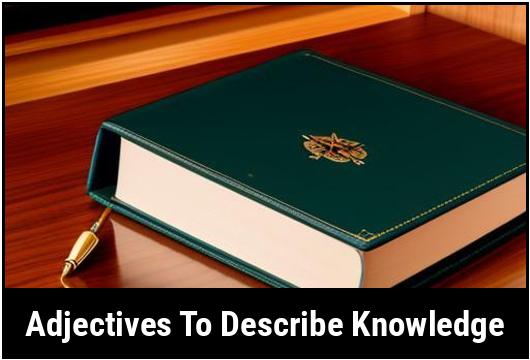- You are here:
- Home »
- adjectives
- » 31 Adjectives To Describe Knowledge

31 Adjectives To Describe Knowledge
Knowledge is a powerful force that drives the progress of humanity. It encompasses the understanding, awareness, and information that contributes to the growth and development of individuals and societies. Describing knowledge with the right adjectives can convey its depth, breadth, and impact. This article explores the various adjectives that aptly characterize knowledge and provides insights on how to choose the right ones.
The concept of knowledge has been fundamental to human existence, shaping the way individuals perceive the world and interact with it. It is a multifaceted entity that encompasses various domains, including academic, practical, philosophical, and experiential knowledge. Understanding and characterizing knowledge with the right adjectives can help to elucidate its significance and implications.
Key Takeaways
- Adjectives play a crucial role in articulating the nature and essence of knowledge.
- Different types of knowledge warrant different adjectives for an accurate portrayal.
- The choice of adjectives can help emphasize the depth, relevance, and impact of knowledge.
Adjectives To Describe Knowledge
1. Vast
Knowledge can be described as vast, encompassing a wide array of information and concepts. It extends beyond a single subject or field, incorporating diverse perspectives and disciplines. Embracing the vastness of knowledge helps us appreciate the interconnectedness of ideas and encourages lifelong learning.
2. Expansive
Similar to its vastness, knowledge is also expansive. It continuously evolves and grows with each new discovery or invention. Our understanding of the world expands with the acquisition of knowledge, challenging preconceived notions and opening doors to new possibilities.
3. Empowering
One of the most remarkable qualities of knowledge is its empowering nature. It equips individuals with the tools and understanding to make informed decisions, take control of their lives, and effect positive change. Knowledge empowers people to overcome challenges, pursue their dreams, and live a fulfilled life.
4. Transcendent
Knowledge transcends time and place, connecting generations and cultures. It enables us to learn from the wisdom of those who came before us, building upon existing knowledge to propel humanity forward. Through knowledge, we can bridge gaps and foster meaningful connections with diverse communities around the world.
5. Liberating
Knowledge acts as a liberating force, breaking the chains of ignorance and narrow-mindedness. It helps us challenge societal norms, question oppressive systems, and advocate for equality and justice. Acquiring knowledge frees individuals from the limitations imposed by ignorance and empowers them to create a better future.
6. Fluid
Knowledge is not static but rather fluid, constantly changing and adapting to new information and developments. It requires us to approach learning with an open mind, embracing new perspectives and updating our understanding in light of fresh insights. The fluidity of knowledge encourages a growth mindset and lifelong learning.
7. Transformative
Knowledge has the power to transform individuals and societies. It alters our perspectives, broadens our horizons, and reshapes our values and beliefs. Through knowledge, we can challenge the status quo, drive innovation, and create positive change in the world. It is a catalyst for personal and societal growth.
8. Inspiring
Knowledge has an inspirational quality that motivates individuals to seek answers, explore new territories, and embark on intellectual adventures. It sparks curiosity and ignites a passion for learning. When we encounter inspiring knowledge, it propels us towards personal and professional achievements.
9. Invaluable
The value of knowledge cannot be overstated. It enriches our lives, broadens our perspectives, and enhances our understanding of the world. Knowledge is an invaluable asset that cannot be taken away, providing us with the means to overcome challenges and seize opportunities.
10. Illuminating
Knowledge has the power to illuminate the darkest corners of our ignorance. It sheds light on complex issues, enabling us to navigate through ambiguity and make informed decisions. As knowledge expands, it illuminates the path towards progress, dispelling misconceptions and allowing us to see reality more clearly.
11. Groundbreaking
At times, knowledge can be groundbreaking, shattering established paradigms and paving the way for new discoveries. Groundbreaking knowledge challenges conventional wisdom, pushing the boundaries of what is known and propelling society forward. It disrupts the status quo and leads to innovative solutions.
12. Timeless
Certain forms of knowledge stand the test of time, remaining relevant across generations. Timeless knowledge reflects enduring truths about human nature, ethics, and the world we inhabit. It helps us understand our past, guides us in the present, and informs our actions for the future.
13. Comprehensive
Knowledge possesses a comprehensive nature, encompassing a wide range of subjects and disciplines. It strives to provide a holistic understanding of the interconnectedness of ideas and encourages interdisciplinary approaches. Comprehensive knowledge recognizes the value of diverse perspectives and promotes collaboration.
14. Life-affirming
Gaining knowledge is a life-affirming pursuit. It enables us to connect with others, understand the beauty and complexity of the world, and appreciate the gift of existence. Knowledge nourishes our intellectual and emotional well-being, bringing meaning and purpose to our lives.
15. Pragmatic
Knowledge has a pragmatic quality, equipping us with practical skills and know-how. It helps us navigate through everyday challenges, make informed decisions, and solve problems. Pragmatic knowledge empowers us to tackle real-world issues and achieve our goals with effectiveness and efficiency.
16. Inquisitive
Knowledge is born out of an inquisitive nature, a thirst for understanding the unknown. It encourages us to ask questions, explore the world with a sense of wonder, and unravel the mysteries that surround us. An inquisitive mindset fuels our desire to learn and enables us to make new discoveries.
17. Universal
While knowledge may be context-specific, certain aspects of it are universal. It transcends cultural and societal boundaries, forming a common ground for human understanding. Universal knowledge fosters empathy and unity, strengthening connections among people from diverse backgrounds.
18. Precious
Knowledge is a precious resource that should be cherished and protected. It represents the collective wisdom of humanity and the culmination of countless efforts to understand the world and improve our shared experience. Recognizing its preciousness encourages us to invest in education and equitable access to knowledge.
19. Liberated
Knowledge liberates individuals from the shackles of ignorance and prejudice. It challenges inherited biases and stereotypes, encouraging us to think critically and embrace diversity. When we are liberated by knowledge, we are able to form our own opinions and make informed decisions.
20. Insightful
Knowledge brings insights that allow us to see patterns, connections, and opportunities that may otherwise go unnoticed. It provides depth and understanding, enabling us to navigate complex situations and unravel intricate problems. Insights born out of knowledge can lead to breakthroughs and transformative change.
21. Harmonious
Knowledge fosters harmony by uniting diverse perspectives and bridging gaps in understanding. It encourages dialogue, empathy, and mutual respect. A harmonious society is built upon shared knowledge that promotes collaboration, inclusivity, and a celebration of diverse ideas.
22. Progressive
By nature, knowledge is progressive. It propels us forward, encouraging growth and innovation. Progressive knowledge challenges outdated beliefs, acknowledges historical failures, and seeks to build a better future. It serves as the driving force behind social, scientific, and technological advancements.
23. Liberating
Knowledge acts as a liberator of the mind, expanding horizons and breaking free from limited thinking. It helps us challenge conventional wisdom, push past boundaries, and question the status quo. Liberating knowledge frees us from mental constraints and encourages creative and critical thinking.
24. Ethical
Knowledge is coupled with responsibility and ethics. It equips individuals with an understanding of the impact of their actions and encourages ethical decision-making. Knowledge fosters empathy, respect, and a sense of shared responsibility towards others and the environment.
25. Holistic
Holistic knowledge acknowledges the interconnectedness of ideas, systems, and disciplines. It encourages a comprehensive and multidimensional understanding of the world. Holistic knowledge promotes integrative thinking, recognizing that isolated fragments of knowledge fail to capture the complexity of reality fully.
26. Empathetic
Knowledge cultivates empathy by fostering a better understanding of others’ experiences, perspectives, and challenges. It helps us develop a compassionate mindset, enabling us to relate to and support one another. Empathetic knowledge promotes inclusivity, respect, and social cohesion.
27. Reflective
Knowledge encourages self-reflection and introspection. It enables us to examine our beliefs, biases, and assumptions critically. Reflective knowledge promotes personal growth and self-improvement, allowing us to learn from our mistakes and make conscious choices aligned with our values.
28. Empowering
Knowledge empowers individuals by equipping them with the skills, information, and resources they need to fulfill their potential. It instills confidence, enabling individuals to navigate through uncertainties, overcome obstacles, and pursue their aspirations. Empowered individuals are catalysts for positive change in society.
29. Collaborative
While individuals acquire knowledge, its true power is unlocked through collaboration. Knowledge thrives in environments that value teamwork, shared learning, and collective problem-solving. Collaboration amplifies the impact of knowledge, leading to innovative solutions and the advancement of society as a whole.
30. Evolutionary
Knowledge is evolutionary by nature, continuously evolving and adapting to new discoveries, insights, and challenges. It expands and refines our understanding, ensuring that what we know today may be built upon and refined by future generations. Embracing knowledge as an ongoing process fuels continuous growth and progress.
31. Mind-expanding
Last but certainly not least, knowledge has a mind-expanding quality that stretches the limits of our intellectual capacities. It challenges us to think beyond our comfort zones, encourages curiosity, and drives us to explore new territories of understanding. Mind-expanding knowledge broadens our perspectives and opens doors to new ideas and possibilities.
Why Use Adjectives To Describe Knowledge
Adjectives are essential in providing a nuanced and detailed description of knowledge. They offer a means to express the qualities, characteristics, and attributes associated with knowledge. By employing adjectives, individuals can effectively communicate the nature of knowledge, its implications, and its relevance to specific contexts. Furthermore, adjectives facilitate a more comprehensive understanding of knowledge by adding layers of meaning and depth to its description.
How To Choose The Right Adjective To Describe Knowledge
Selecting the right adjectives to describe knowledge involves considering various factors such as the context, nature of knowledge, and the intended effect. It is essential to assess the specific facets of knowledge that need to be emphasized and the tone that aligns with the desired portrayal. Additionally, understanding the connotations and implications of different adjectives is crucial in accurately capturing the essence of knowledge.
Types Of Adjectives For Describing Knowledge
Adjectives used to describe knowledge can be categorized based on their connotations, implications, and applicability to different forms of knowledge. Understanding the nuances of these adjectives can aid in effectively capturing the essence of knowledge. The various types of adjectives for describing knowledge include:
- Qualitative Adjectives
- Quantitative Adjectives
- Descriptive Adjectives
- Subjective Adjectives
- Objective Adjectives
Qualitative Adjectives
Qualitative adjectives convey the essential nature and attributes of knowledge. They highlight the inherent qualities and characteristics that define the nature of knowledge. Examples of qualitative adjectives to describe knowledge include profound, extensive, comprehensive, and insightful. These adjectives emphasize the depth, breadth, and meaningfulness of knowledge, providing a qualitative perspective on its nature.
Quantitative Adjectives
Quantitative adjectives relate to the measure, quantity, or extent of knowledge. They provide a numerical or quantitative framework for describing the scope and magnitude of knowledge. Examples of quantitative adjectives for knowledge include vast, limited, abundant, and minimal. These adjectives offer insights into the scale and extent of knowledge, enabling a quantitative understanding of its reach and impact.
Descriptive Adjectives
Descriptive adjectives depict the specific details, characteristics, and features of knowledge. They help in delineating the specific aspects, components, and elements that constitute knowledge. Examples of descriptive adjectives for knowledge include practical, theoretical, empirical, and intuitive. These adjectives focus on articulating the different facets and dimensions of knowledge, facilitating a more detailed and comprehensive description.
Subjective Adjectives
Subjective adjectives convey the personal, emotional, and intuitive aspects of knowledge. They reflect the individual’s subjective experience, perception, and interpretation of knowledge. Examples of subjective adjectives for knowledge include inspiring, enlightening, uplifting, and thought-provoking. These adjectives capture the emotive and personal significance of knowledge, offering a subjective lens through which its impact and relevance are portrayed.
Objective Adjectives
Objective adjectives embody the impartial, factual, and empirical attributes of knowledge. They emphasize the verifiable, evidence-based, and objective nature of knowledge. Examples of objective adjectives for knowledge include empirical, verifiable, factual, and provable. These adjectives underscore the empirical basis and factual reliability of knowledge, presenting it from an objective and evidence-driven perspective.
The choice of adjectives to describe knowledge holds significant implications for how it is perceived, understood, and valued. By utilizing the appropriate adjectives, individuals can effectively communicate the depth, breadth, and impact of knowledge. Different types of adjectives cater to various aspects of knowledge, enabling a comprehensive portrayal that captures its qualitative, quantitative, descriptive, subjective, and objective dimensions. Ultimately, the selection of adjectives plays a pivotal role in articulating the essence and significance of knowledge, fostering a deeper appreciation for its diverse manifestations and contributions to society.
Examples Of Adjectives For Different Types Of Knowledge
Knowledge is a powerful tool that shapes our understanding of the world. It helps us make informed decisions, solve problems, and broaden our perspectives. When we want to describe knowledge, we often turn to adjectives to provide a more detailed and nuanced account. Adjectives enable us to convey the depth, clarity, and extent of knowledge we possess.
-
Deep knowledge: This refers to a profound understanding of a particular subject or field. For example, someone with deep knowledge of astrophysics would have comprehensive insights into the workings of the universe.
-
Broad knowledge: This describes a wide-ranging understanding of various subjects or disciplines. A person with broad knowledge would have a diverse range of information across different topics, making them well-rounded and versatile.
-
Specialized knowledge: This denotes expertise in a specific area or domain. For instance, a surgeon possesses specialized knowledge in the field of medicine and surgical procedures.
-
Practical knowledge: Also known as "hands-on" knowledge, this refers to the ability to apply theoretical concepts in real-life situations. Someone with practical knowledge not only understands the theory but can effectively implement it in practical scenarios.
-
Theoretical knowledge: This refers to knowledge acquired through studying concepts or abstract ideas. It is often gained through reading, research, or formal education. For example, someone with theoretical knowledge of economics would have a strong understanding of economic theories and principles.
-
Expert knowledge: This reflects high-level proficiency and mastery in a specific subject or field. An expert possesses extensive knowledge, experience, and skills, often gained through years of study and practice.
-
In-depth knowledge: This implies a comprehensive understanding of a particular subject, including its intricacies and complexities. It signifies a thorough exploration and analysis of the subject matter.
-
General knowledge: This refers to a broad understanding of various subjects that are not necessarily specialized or in-depth. It encompasses general information and facts across multiple areas.
-
Up-to-date knowledge: This describes knowledge that is current and reflects the latest information and developments in a specific field. It is often crucial in areas that are rapidly evolving, such as technology or scientific research.
-
Intuitive knowledge: This refers to knowledge gained through intuition or instinct rather than through formal education or study. It is often based on an individual’s deep understanding and ability to make connections without explicit explanation or reasoning.
-
Breadth of knowledge: This signifies the range and variety of subjects or topics that an individual is knowledgeable in. It reflects a person’s ability to grasp and comprehend a wide array of information.
-
Comprehensive knowledge: This implies a thorough understanding of a subject that encompasses all its aspects, leaving no significant gaps in knowledge or understanding.
Common Mistakes In Using Adjectives To Describe Knowledge
While using adjectives to describe knowledge can enhance our communication, it’s essential to avoid common mistakes to accurately convey the intended meaning. Here are some common mistakes to watch out for:
-
Overuse of generic adjectives: It is often tempting to use generic adjectives such as "good," "excellent," or "great" to describe knowledge. However, these adjectives lack specificity and fail to provide a detailed understanding of someone’s expertise or understanding. Instead, opt for more specific adjectives that accurately capture the nuances of the knowledge being described.
-
Using adjectives without context: Adjectives describing knowledge should be used in the appropriate context to provide clarity. Simply stating that someone has "extensive knowledge" without specifying the subject matter can be vague. Providing context helps the reader or listener understand the area in which the knowledge is applied.
-
Misusing adjectives: It is crucial to use adjectives correctly to convey the intended meaning accurately. A common mistake is using adjectives that do not align with the type of knowledge being described. For example, using the term "practical knowledge" to describe someone’s expertise in theoretical physics can be misleading.
-
Neglecting the audience’s understanding: When describing knowledge, it is crucial to consider the audience’s level of understanding. Using overly technical or specialized terms may alienate readers or listeners who are not familiar with the subject. Conversely, oversimplifying the description may undermine the depth or significance of the knowledge being conveyed.
Using Adjectives Effectively
To effectively use adjectives when describing knowledge, consider the following tips:
-
Choose adjectives that accurately reflect the intended meaning: Select adjectives that convey the specific qualities and characteristics of the knowledge being described. Consider the depth, breadth, specialization, relevance, and currency of the knowledge and choose adjectives accordingly.
-
Provide context: It is essential to provide context when using adjectives to describe knowledge. Specify the subject, field, or domain to help the audience understand the area in which the knowledge is applied. Contextual information ensures that the description is clear and meaningful.
-
Consider the audience: Tailor the adjectives used to describe knowledge according to the audience’s level of understanding. Strike a balance between technical accuracy and accessibility, ensuring that the description is comprehensive but not overwhelming.
-
Use adjectives in conjunction with other descriptors: Instead of relying solely on adjectives, use them in conjunction with other descriptive elements to provide a more comprehensive picture. Incorporate examples, anecdotes, or specific achievements to bolster the understanding of the knowledge being described.
-
Vary your adjective choices: Avoid repetitive or monotonous use of adjectives when describing knowledge. Varying your adjective usage keeps the description engaging and avoids monotony.
Exercises And Practice
To practice using adjectives to describe knowledge, consider the following exercises:
-
Create a resume: Imagine you are writing a resume for someone who possesses exceptional knowledge in a particular field. Use appropriate adjectives to describe their expertise and skills. For example, "Demonstrated deep knowledge in environmental sustainability, contributing to the development of innovative green initiatives."
-
Describe a famous scientist: Select a famous scientist and describe their knowledge using a variety of adjectives. For instance, "Albert Einstein possessed an unparalleled breadth of knowledge, delving into theoretical physics and revolutionizing our understanding of time and space."
-
Discuss a favorite hobby: Think of your favorite hobby and describe the knowledge you have acquired in that area. Use appropriate adjectives to convey the depth, practicality, or specialization of your knowledge. For example, "Through years of gardening, I have developed practical knowledge in organic farming techniques, enabling me to cultivate flourishing and sustainable vegetable gardens."
-
Write a product review: Choose a product and write a review highlighting your knowledge and experience using it. Use adjectives to describe your understanding of the product, its features, and its usability. For instance, "As an experienced graphic designer, I appreciate the intuitive interface and comprehensive toolset offered by this software, making it an indispensable asset in my creative process."
Conclusion
Adjectives are valuable tools for describing knowledge in precise and detailed ways. By using adjectives effectively, we can communicate the depth, breadth, specialization, and currency of knowledge in various contexts. It is important to choose adjectives that accurately reflect the intended meaning, provide context, consider the audience, and use adjectives in conjunction with other descriptive elements. By practicing and honing our ability to describe knowledge using adjectives, we can enhance our communication and appreciation of the vast world of knowledge that surrounds us.
FAQS On Adjectives To Describe Knowledge
What Are Some Adjectives To Describe Knowledge?
Some adjectives to describe knowledge include expansive, comprehensive, insightful, profound, and erudite.
What Does It Mean To Have Expansive Knowledge?
Having expansive knowledge means possessing a wide range of information on various topics, having a broad understanding of different subjects, and being able to connect and integrate this knowledge effectively.
Can You Provide Examples Of Adjectives That Describe Comprehensive Knowledge?
Some adjectives that describe comprehensive knowledge are thorough, exhaustive, complete, and all-encompassing.
What Does It Mean To Have Insightful Knowledge?
Having insightful knowledge refers to possessing a deep understanding and awareness of a subject matter, being able to see beyond the surface level, and providing thoughtful and perceptive insights.
Is Erudite The Same As Knowledgeable?
Erudite and knowledgeable are similar in the sense that they both describe having extensive knowledge or being well-informed. However, erudite carries a connotation of being well-educated and scholarly, while knowledgeable is a more general term.








